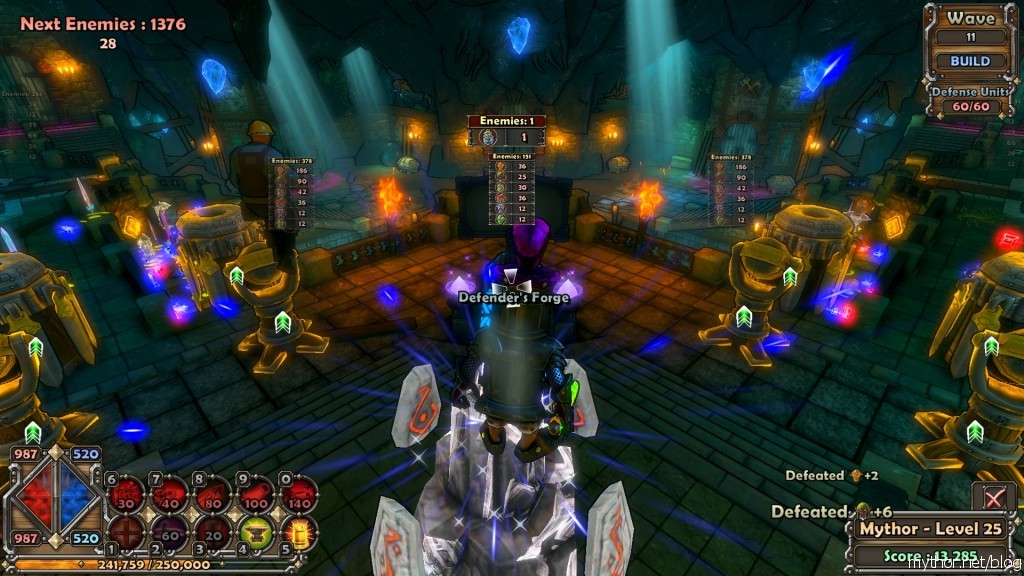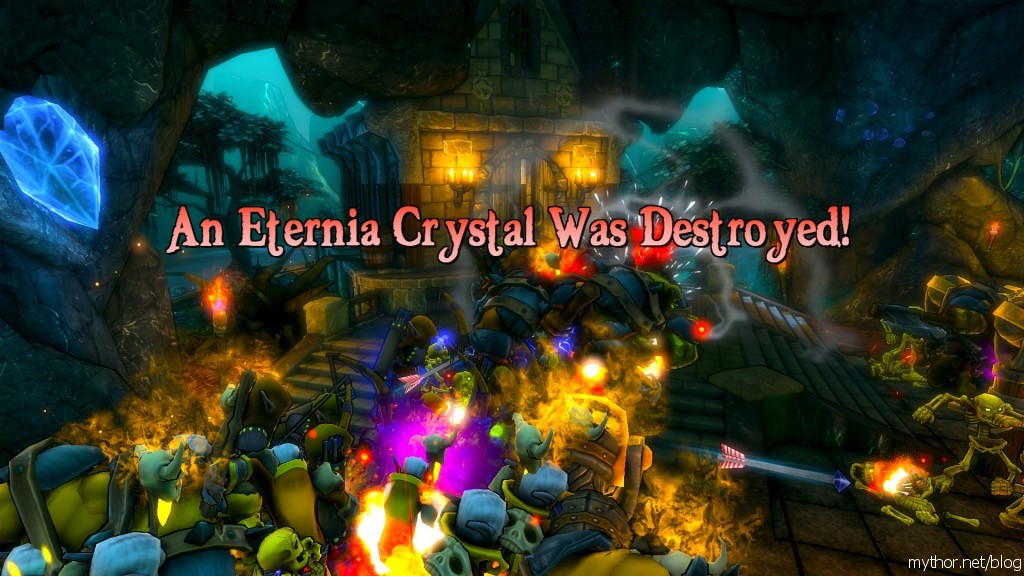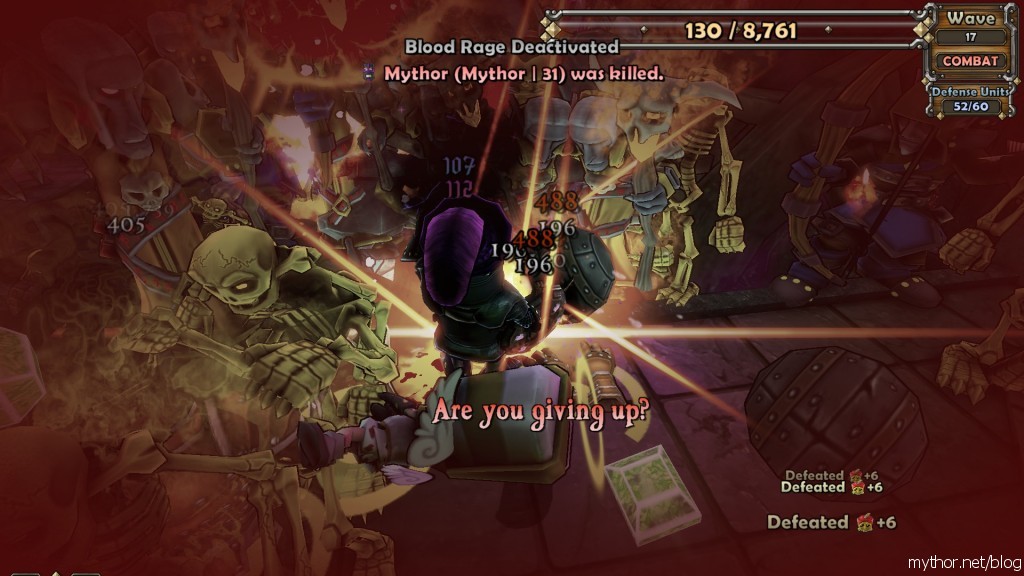Short answer: Yes. If a multiplayer tower defense game with third person action RPG trappings sounds interesting, Dungeon Defenders is that and you should buy it.
Long answer: For some reason I occasionally get people asking me if Game X is any good, especially if I have the Steam Community logged in while playing something. I don’t know why anyone would ask me, I play all sorts of random crap!
But never have so many people asked after Dungeon Defenders. There’s been a few questions on Twitter and a few via Steam Chat and rather than answer any more individually… BLOG POST.
As per the short answer, Dungeon Defenders is yet another tower defense style game. You get a certain amount of resources – mana in this instance – to construct various towers and barricades and other traps to slow or kill waves of enemies. Each enemy drops some more mana, letting you place more defenses or upgrade and repair the ones you’ve already placed.
That’s fairly standard for a tower defense game and there’s plenty of excellent examples that only take the idea that far.
Unlike other tower defense games, Dungeon Defenders doesn’t have you sit above the playing field as the bad guys roll in. You play as an actual hero in the world and can choose to fight the monsters directly, with sword, bow or magic, or take on the role of a mechanic, fixing defenses up or even building new ones on the fly.
In the early stages of a map it is often essential to get into the fight yourself, or at least expedient to do so. The sooner you wipe out a wave the sooner you get some new treasure chests full of mana to improve upon your defenses.
But Dungeon Defenders’ additions don’t stop there. Rather than just being a stock standard hero type you can choose between, initially, four different hero classes.
The Apprentice is supposed to be the “newbie” class. Play as an Apprentice and you’re a wizard, capable of shooting balls of light from your staff – or charging up for a more damaging blast – as a primary attack and emitting a damaging shockwave that throws enemies back for a secondary attack.
The Squire is a slightly more advanced class, according to the in-game description, and sees you take on the role of a mini-knight. You can swing your sword to slice up foes or hold it up to block attacks for your secondary. It’s often better to simply swing faster and kill things, rather than block…
The third class is the Huntress, the ranged specialist, equipped with a crossbow. The primary attack for the Huntress is simply shooting the crossbow with the secondary reserved for reloading. Crossbows in Dungeon Defenders often have 20 or more bolts preloaded. Via magic or something.
Last of the base classes is the Monk. The monk has a basic melee attack and a basic ranged magic attack for a secondary.
The differences don’t end at the physical look or choice of weaponry, either. Each class has their own set of unique defenses they can construct.
The Apprentice can mostly construct magical towers to damage foes from a distance.
The Squire has a few barricade type options, along with a harpoon turret and a cannonball turret.
The Huntress has a variety of traps that can be placed on the floor and triggered when an enemy is in proximity.
The Monk doesn’t get any real buildings but can instead set an area with an aura, damaging or debilitating foes or healing up friendly heroes.

Each class also gets a self heal spell and a couple of other abilities you won’t really use much since you’re saving your mana for defenses, repairs and upgrades!
Dropping from enemies and treasure chests is a variety of loot for your hero. Different weaponry and armour with better or worse statistics and skill modifiers. Fairly standard RPG stuff, though the armour you find isn’t shown on your character in any way. Weapons vary wildly in appearance and sometimes even in their basic functionality – the Huntress’ crossbow can be replaced with a rapidfire minigun or a single shot dragon fire launcher… thing.
Each character has eight skills they can assign points to when they reach a new level. There’s the basic “more health” and “more damage” skills but also options to fortify the health of your defenses, cause them to do more damage or affect a larger area. It’s not something where you can “ruin” a character by not putting the points in the “right” spots, and there is a respec option available, but the benefits of investing heavily in a certain area are obvious. A Squire who’s spent a lot of their skill points in increasing their health will be very tough indeed while one who has focused on increasing the health of their constructed barricades will have an easy time keeping monsters safely at a distance.
All of these skills and defenses aid you in preventing the various monsters from reaching your “Eternia Crystal”, which the lore tells you contains the souls of ancient demons and releasing them would be bad. Or something.

Defend the crystal or it’s game over, you’re not going to care beyond that!
Certain maps start with a series of progressively tougher enemies and you simply need to survive the final wave to move on. Others see you survive the final wave and then the game will throw a boss fight at you.
And these aren’t your average tower defense boss fights, where it’s just a tougher version of an existing foe. Dungeon Defenders has a flying demon, a giant dragon that can roast you alive and probably other beasties I’ve not even seen yet. Even for an appropriately tough group the boss fights can take a significant amount of time and will likely result in more than one death in the party.
Fortunately, death just means losing your mana reserves and having to wait for a respawn timer!
If that’s not enough for you then the game also has assorted “Challenge” modes, where you’re given a specific restriction such as “No Towers” and must prevail. You can also set up a map in “Survival” mode – the enemies will just keep coming, forever, in tougher and tougher forms, until they break through your defense and destroy your crystal.

But wait, there’s more! You can play the game with up to three other people, all defending the same crystal or crystals, all capable of constructing their defenses and attacking the waves of enemies that come pouring through the gates. This can make life a lot easier for you.
When those other people aren’t gobbling up all the mana to build defenses in stupid places. Or pinching all the good loot. Or using the voice chat system in a manner most unbecoming.
Or, if you’ve joined someone else’s game, just plain kicking you out for Stupid Reason X.
And when you do get a game with other folks, hopefully it won’t be laggy or randomly decide to disconnect you from the host, or…
Dungeon Defenders is certainly not without its issues, but the depth and replayability present exceeds that of much bigger name games and all at a fraction of the price, a mere $15 from Steam.
Dungeon Defenders is simply a must have. I don’t know why you’re even still reading this instead of buying the darn thing already.